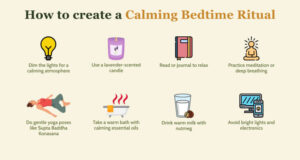A good night’s sleep is not just about falling asleep; it’s about giving your mind the peace it needs without tossing and turning all night. Did you know that 30%-40% of adults in the U.S. report experiencing symptoms of Insomnia?
If you’re experiencing this, rest assured you’re not the only one. Insomnia is a common condition that disrupts your ability to fall asleep, stay asleep, or wake up too early, leading to daytime fatigue and irritability. Fortunately, we’re here to guide you with proven tips to manage your sleep better and reclaim those restful nights.

1. Establish a Sleep Routine
A regular sleep schedule can greatly improve the quality of your sleep. Try to have a consistent routine of going to bed and waking up, even on weekends. When you have a routine, it helps regulate your body’s internal clock. Consider setting an alarm one hour before bedtime as a reminder to wind down.
For example, create a calming pre-sleep ritual with activities like reading or light stretching. Consider it a simple practice to train your body to understand when it’s time to rest. In Ayurveda, a routine helps balance your Vata dosha, creating a peaceful mind ready for sleep.

2. Create a Relaxing Bedtime Ritual
What you do before bed matters! Engage in calming activities like reading, gentle yoga poses such as Reclining Butterfly Pose (Supta Baddha Konasana), or a short meditation to release any tension from the day. Ayurveda suggests a warm bath infused with calming herbs or oils like lavender, or a soothing foot soak to promote relaxation, especially if you’re balancing Vata energy. Before bed, sip a warm glass of milk with a pinch of nutmeg, a classic Ayurvedic remedy that pacifies Vata dosha and calms the nervous system, helping you unwind
If you prefer, include Nadi Shodhana (alternate nostril breathing) to further calm your mind. For an added touch, practice Abhyanga (self-massage) with warm sesame oil to relax the body and promote a sense of grounding. Avoid stimulants like caffeine or heavy meals and aim for a consistent bedtime to align with your natural rhythms, supporting deep, restorative sleep.

3. Optimize Your Sleep Environment
Your bedroom should be a sanctuary for sleep. Keep it dark, quiet, and cool to create an ideal sleeping atmosphere. Use blackout curtains to block out any light, and consider a white noise machine or fan to mask disruptive sounds. Have a comfortable pillow and mattress for a good sleep.
An Ayurvedic touch can include using natural bedding materials like cotton or silk, which help regulate body temperature and keep you comfortable, making it easier to drift off to dreamland.

4. Watch Your Diet
What you eat and drink impacts your sleep more than you might think. Steer clear of heavy meals, caffeine, and alcohol in the hours leading up to bedtime. Instead, opt for lighter, easily digestible snacks if you’re hungry. Think about enjoying a warm glass of milk with a pinch of nutmeg—it’s a time-honored Ayurvedic remedy that calms the nervous system. Nutmeg has mild sedative properties, making it a perfect addition to your nighttime routine. By doing this, you can help balance your vital energy (Vata dosha) and naturally prepare your body for restful sleep.

5. Stay Active During the Day
Staying active regularly can make a big difference in how well you sleep. Try to have at least 30 minutes of exercise most days, whether it’s a brisk walk, cycling, or yoga. When you indulge in physical movement, it helps ease stress and anxiety, two common culprits behind Insomnia. If you have a busy schedule, try fitting in quick activities—like taking the stairs or doing a mini workout on your break. In Ayurveda, staying active helps balance your vital energies (Vata and Kapha doshas), boosting your overall health and setting the stage for more restful sleep.
6. Limit Naps
While napping can feel refreshing, it can disrupt your nighttime sleep patterns if overdone. If you decide to take a nap, aim for it to be brief—about 20 to 30 minutes—and avoid napping too late in the day. It helps you recharge without compromising your ability to fall asleep at night. An Ayurvedic approach suggests that a brief nap can help balance your biological energies, but be mindful of the timing to ensure you’re not sacrificing your nighttime rest.
7. Manage Stress and Anxiety
Stress is a major player in Insomnia. Engaging in relaxation techniques can soothe your mind and facilitate a smoother transition to sleep. Think about adding deep breathing exercises, meditation, or gentle yoga to your evening routine. As a tip, consider setting aside just 10 minutes before bedtime to practice mindfulness.
Ayurveda emphasizes the importance of breath control (Pranayama), for soothing the nervous system. Regularly engaging in these calming activities can help balance your Vata dosha, promoting a sense of peace as you prepare for sleep.

8. Limit Fluid Intake Before Bed
To minimize nighttime trips to the bathroom, be mindful of your fluid intake in the evening. While staying hydrated is essential, reducing liquids close to bedtime can help you stay asleep longer. A practical tip is to set a cutoff time for drinking fluids—try stopping an hour before bed. An Ayurvedic recommendation is to drink warm water or herbal teas earlier in the evening. Chamomile or tulsi tea can help calm your mind and body while keeping you hydrated, setting the stage for a restful night’s sleep.
9. Create a Sleep-Friendly Atmosphere
Your sleep environment is crucial for getting a good night’s rest. Use comfortable bedding and pillows that support your preferred sleeping position. A clean, clutter-free space can also help reduce stress and promote relaxation. Think about adding calming decor or natural elements like plants to enhance your bedroom’s serenity. According to Ayurveda, a harmonious environment can balance the energy in your room. Using light colors and natural materials can enhance comfort and tranquility, helping you drift off to sleep more easily.

10. Invest in a Comfortable Bed, Mattress, and Pillow
A cozy bed is crucial for a restful night. The right mattress and pillow can significantly impact your sleep quality. Look for a mattress that offers proper support for your body type, ensuring your spine stays aligned. Additionally, select a pillow that matches your sleeping position—whether you sleep on your back, side, or stomach. A suitable pillow helps keep your neck aligned and minimizes discomfort, making it easier to drift off into a peaceful slumber.
Consider using natural materials, like organic cotton or latex, which can help regulate temperature and moisture, promoting a more restful sleep. In Ayurveda, a well-supported body aids in balancing doshas, leading to a tranquil mind and deeper sleep. Prioritizing a comfortable sleep environment can transform your nights from restless to restorative.
11. Seek Professional Help When Needed
If you’re still struggling with Insomnia despite trying different strategies, it might be a good idea to reach out to a healthcare provider or sleep specialist for help. Identifying underlying issues like anxiety, depression, or medical conditions is crucial for effective treatment. An Ayurvedic practitioner can assess dosha imbalances and offer personalized strategies to help you find restful sleep. Don’t hesitate to seek support—combining holistic approaches with conventional treatments can provide a comprehensive strategy for managing Insomnia, ensuring you’re on the right path to rejuvenating sleep.
Don’t Let Insomnia Hold You Back—Discover Your Path to Restful Nights with LYBL
Insomnia can be challenging, but you can reclaim your sleep with the right strategies. Remember, managing your sleep is not just about falling asleep; it’s about creating an environment that promotes relaxation and peace.
At LYBL, we are here to support you on this journey. Our app provides personalized insights and holistic resources to help you tackle Insomnia with ease. Join our community and discover expert-curated content, guided meditations, and Ayurvedic practices designed to enhance your sleep quality and overall well-being. Together, let’s unlock the secret to peaceful nights and refreshed mornings.































